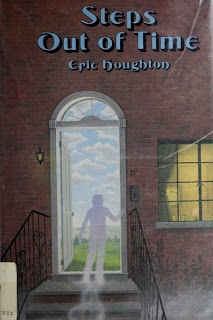Jonathan and his father have just moved into a house of their own in a small English town (Jonathan's mother is dead). The house needs lots of work to make it into a comfortable home, but both of them are optimistic about it. Jonathan, shy and kind of social awkward, is a lot less optimistic about being the new kid as school, and indeed, quickly finds himself the butt of unkind jokes.
Walking home from school, he takes comfort from the thick mist that gathers along the river at twilight... but then, walking through it back to his home, he opens the door to find a strange house, with strangers living in it. He tries to believe it's just a confusion from the mist, but it happens again, and he's forced to accept that sometimes he walks into a different reality. The oddest thing is that in that reality he is a boy named Peter, with Peter's words flowing naturally out of this mouth, and Peter's body doing things Jonathan couldn't do--rowing and climbing and drawing and painting brilliantly. Lots of things are different in this reality--landmarks in the town have changed, and there is strange technology. It is, in fact, the future.
Jonathan's time spent living as Peter, with Peter's family, especially his sister Helen, changes Jonathan; even back in his own body he retains some of Peter's muscle memory, and his art wins him the admiration of his peers and becomes a bridge leading to group acceptance. And whatever magic drew him into Peter's time comes to an end. There are lots of bits I liked about Jonathan figuring out he can draw and paint--full of good detail about shading and perspective and light, etc.
If this sounds like a somewhat slight plot, that's because it is. But it is very atmospheric and fascinating. I ended the book thinking the author was not very good at future tech, and indeed those bits of the book were often awkward reading, but then I did the math. I was about the same age as Jonathan in 1979, and it is now about the same age as the fictional future time. I wouldn't have had any trouble with the portrayal of the future if I'd read the book when it first came out, so it's not a fair criticism!
One place where I am still very sure the author faltered is with regards to Peter's mother in the future. Jonathan has lost his own mother, and is periodically embodied as another boy with a loving mother--this should have elicited strong and poignant emotion, but didn't. A lost opportunity, which weakened the book.
But in any event, I think I would have loved it as a child* --and even as an adult, I find myself replaying it in my mind's eye, seeing the images from the story vividly, and filling in emotional weight that isn't in the original. I was impressed enough by the book to see what else Eric Houghton wrote, and am disappointed that most of his books seem to be for younger children than me (or about Sparticus). I have added Gates of Glass to my tbr list, though.
*every summer my sisters and I went back to the United States to stay with our grandparents, and I tried to read all the books in the children's section of the Arlington VA Central Library. Some summers I started at A. others at Z, but never in the middle, and so 1970s authors from about H to N are often new to me.

